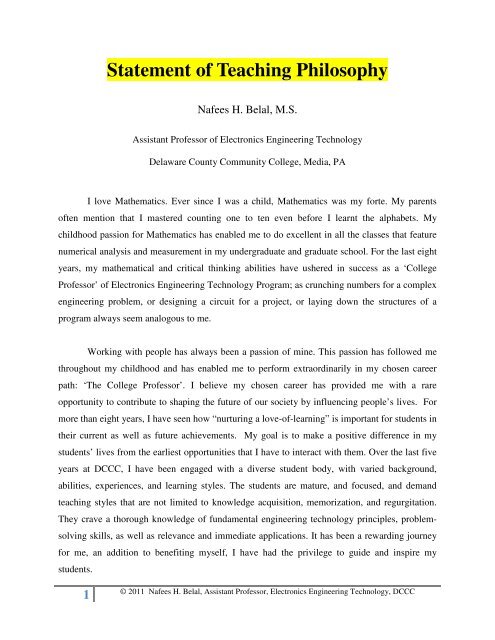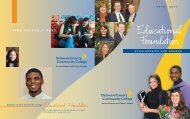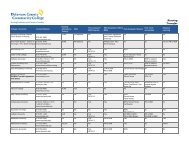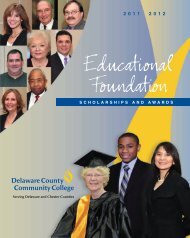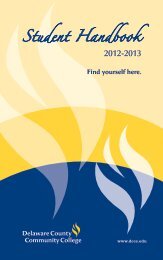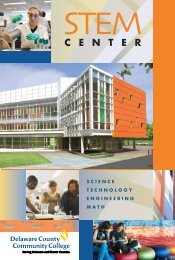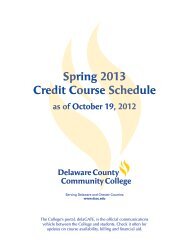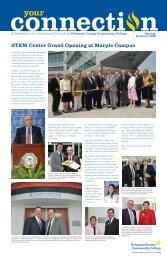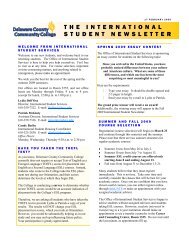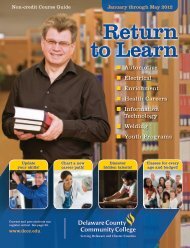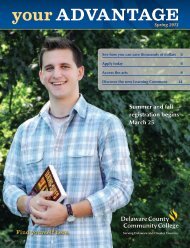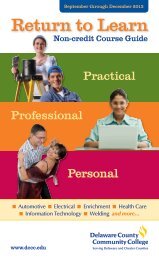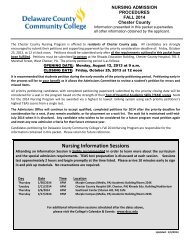Teaching Philosophy of Nafees Belal - Delaware County Community ...
Teaching Philosophy of Nafees Belal - Delaware County Community ...
Teaching Philosophy of Nafees Belal - Delaware County Community ...
You also want an ePaper? Increase the reach of your titles
YUMPU automatically turns print PDFs into web optimized ePapers that Google loves.
Statement <strong>of</strong> <strong>Teaching</strong> <strong>Philosophy</strong><br />
<strong>Nafees</strong> H. <strong>Belal</strong>, M.S.<br />
Assistant Pr<strong>of</strong>essor <strong>of</strong> Electronics Engineering Technology<br />
<strong>Delaware</strong> <strong>County</strong> <strong>Community</strong> College, Media, PA<br />
I love Mathematics. Ever since I was a child, Mathematics was my forte. My parents<br />
<strong>of</strong>ten mention that I mastered counting one to ten even before I learnt the alphabets. My<br />
childhood passion for Mathematics has enabled me to do excellent in all the classes that feature<br />
numerical analysis and measurement in my undergraduate and graduate school. For the last eight<br />
years, my mathematical and critical thinking abilities have ushered in success as a ‘College<br />
Pr<strong>of</strong>essor’ <strong>of</strong> Electronics Engineering Technology Program; as crunching numbers for a complex<br />
engineering problem, or designing a circuit for a project, or laying down the structures <strong>of</strong> a<br />
program always seem analogous to me.<br />
Working with people has always been a passion <strong>of</strong> mine. This passion has followed me<br />
throughout my childhood and has enabled me to perform extraordinarily in my chosen career<br />
path: ‘The College Pr<strong>of</strong>essor’. I believe my chosen career has provided me with a rare<br />
opportunity to contribute to shaping the future <strong>of</strong> our society by influencing people’s lives. For<br />
more than eight years, I have seen how “nurturing a love-<strong>of</strong>-learning” is important for students in<br />
their current as well as future achievements. My goal is to make a positive difference in my<br />
students’ lives from the earliest opportunities that I have to interact with them. Over the last five<br />
years at DCCC, I have been engaged with a diverse student body, with varied background,<br />
abilities, experiences, and learning styles. The students are mature, and focused, and demand<br />
teaching styles that are not limited to knowledge acquisition, memorization, and regurgitation.<br />
They crave a thorough knowledge <strong>of</strong> fundamental engineering technology principles, problemsolving<br />
skills, as well as relevance and immediate applications. It has been a rewarding journey<br />
for me, an addition to benefiting myself, I have had the privilege to guide and inspire my<br />
students.<br />
1<br />
© 2011 <strong>Nafees</strong> H. <strong>Belal</strong>, Assistant Pr<strong>of</strong>essor, Electronics Engineering Technology, DCCC
“Give a man a fish, and he eats for a day. Teach him how to fish, and he eats for a<br />
lifetime.” – An Ancient Chinese Proverb.<br />
This proverb has a tremendous impact in my life and the core philosophy <strong>of</strong> my teaching<br />
has roots in this proverb. I believe I have an extremely important task vested in me; through my<br />
teaching I can change people’s lives and impact society. My personal belief is: “The primary<br />
responsibility <strong>of</strong> a teacher is to provide students with the skills, knowledge and experience<br />
necessary so that they have the ability to be successful in their chosen career paths and lives”. At<br />
the soul <strong>of</strong> my teaching philosophy, I believe that students need to be not just educated in subject<br />
matter, but mentored, which will let them fully appreciate the opportunities that exist during their<br />
college years. The years students spend as an associate level engineering technology student are<br />
among the most foundational and vital in developing a pr<strong>of</strong>essional’s life. Approaches, skills,<br />
and perceptions established, and assimilated; at this time provide a template for the rest <strong>of</strong> their<br />
years in a challenging and rewarding pr<strong>of</strong>ession.<br />
I believe that teaching is much more than just delivering information in a suitable format<br />
to our students. I believe that one <strong>of</strong> my most vital roles is to help students learn how to learn, as<br />
well as how to efficiently solve problems, and how to judge the long-range impact <strong>of</strong> their<br />
solutions, their decisions and the impact on the society that their actions will have. I always<br />
attempt to make students, active participants in their education by making my lectures mutual<br />
experiences. I always ask questions to all my students and welcome any question, at any given<br />
point, in my lecture. Collaborative lectures and ‘on the spot thinking’ enables the student to learn<br />
how to form their own view <strong>of</strong> the material they are presented with. I believe students do not<br />
learn materials if I only lecture; rather the learning takes place with active participation. To be a<br />
successful engineer/technologist means to see life through a very diverse set <strong>of</strong> eyes as is<br />
common to most people.<br />
My teaching methods provide for different ‘active learning’ methods which helps in the<br />
learning process. To implement these methods I carefully design my lectures with several ‘class<br />
participation’ activities which range from critical problem solving to building a small electronic<br />
circuit using (MultiSim s<strong>of</strong>tware). I expect students to be active contributors in the learning<br />
2<br />
© 2011 <strong>Nafees</strong> H. <strong>Belal</strong>, Assistant Pr<strong>of</strong>essor, Electronics Engineering Technology, DCCC
process. With this expectation, I function as a facilitator in the learning process, rather than the<br />
simple deliverer <strong>of</strong> the material. Knowing that students learn in a variety <strong>of</strong> ways, my goal is to<br />
try to accommodate varied styles. In order for these problem-based, collaborative, and active<br />
learning techniques to be effective, a ‘pleasant learning environment’ is critical. The basic<br />
element to create such an environment is ‘care for students’. I find that in showing ‘genuine<br />
care’ in their learning effectiveness, their understanding <strong>of</strong> course materials, their progress, their<br />
opinion, and their balance <strong>of</strong> work and college and family, students instill their trust in me. I am<br />
always available to students before, during and after class and I always encourage discussion.<br />
Students are welcome to e-mail and/or call me anytime beside my formal <strong>of</strong>fice hours.<br />
Students working in ‘small groups’ or ‘teams’ on projects, laboratory assignments and<br />
class participation problems makes a difference in the student learning process. In this way<br />
students take more responsibility for their education. I expose my students to problems where<br />
they must find statistics, figures, and data openly rather than narrowly from their required<br />
textbooks. Students can discover their own intellectual capabilities in a team environment by<br />
exercising these carefully designed lecture materials and/or special laboratory projects. Most <strong>of</strong><br />
these projects conclude in a written report, which include providing answers to related questions<br />
so that students can share their ideas as well as technical information through effective<br />
communicating. This is a vital aspect <strong>of</strong> engineering/technology education since industry people<br />
normally work cooperatively.<br />
One <strong>of</strong> the most important skills an engineer/technologist can achieve is ‘Critical<br />
thinking’. In order to solve variety <strong>of</strong> new and innovative problems, engineers/technologists must<br />
be able to think logically. Most <strong>of</strong> the time, the final solution to a problem is hardly apparent.<br />
The thinking process <strong>of</strong> the student must be refined and improved via practice, over and over. I<br />
try to make sure my assigned home works, projects, class participation problems, and laboratory<br />
projects reflect critical thinking. Through example problems, and several demonstrations in class,<br />
I lead my students to the process <strong>of</strong> problem solving.<br />
3<br />
© 2011 <strong>Nafees</strong> H. <strong>Belal</strong>, Assistant Pr<strong>of</strong>essor, Electronics Engineering Technology, DCCC
Many Electronics Engineering Technology topics and concepts are repeated in several<br />
courses and can initially seem like disjointed ideas. But, in real life, this knowledge is<br />
commutative and, they work as ‘building blocks’ providing meaning to the knowledge you<br />
gained in the first electronics course. In my lecture, I show the cohesive nature <strong>of</strong> these concepts<br />
by presenting several <strong>of</strong> their manifestations. This helps the students to recognize that learning in<br />
one class directly applies to several others in their curriculum.<br />
Relating each electronics engineering technology concepts with ‘real world problems’ is<br />
one <strong>of</strong> the vital components <strong>of</strong> my teaching methods. My experience proves that students engage<br />
in double the attention and interest in a topic as I relate an example problem with real life<br />
(industry) situation. Through this process students realize that engineering/technology solutions<br />
exist to meet the needs <strong>of</strong> society. I attempt to show how classroom exercise relates to the<br />
challenges that face a practicing engineer/technologist. Further, I try to work on computer<br />
s<strong>of</strong>tware and other advanced techniques in my classroom to make the class rich. Often, I refer<br />
to interesting journal publication and/or YouTube videos related to any new, state-<strong>of</strong>-the-art<br />
Electronics Engineering Technology product/equipment.<br />
As a pr<strong>of</strong>essor, I have a strong personal belief that I should be extremely sensitive to the<br />
background as well as to the preparation <strong>of</strong> the students. Individual performance has a great<br />
influence on how the student is treated by the pr<strong>of</strong>essor. I declare several times, each semester<br />
that my <strong>of</strong>fice hours as well as other times are available for student needs. These needs go far<br />
beyond clarifying lecture, homework, or exam materials. I willingly invite students to discuss<br />
with me any problems they are having that might impact on their success. I try to openly have a<br />
conversation with my students at break time and before/after class regarding their ‘career goals’<br />
and the different career and transfer opportunities that await them. I believe that as individuals<br />
participating in a learning environment, that mutual respect, between the students and me is<br />
paramount. I go all-out to earn students' respect in a variety <strong>of</strong> ways, given that respect cannot<br />
simply be awarded. I take a sincere interest in the well-being <strong>of</strong> students and interact with them<br />
on pr<strong>of</strong>essional and (with-in reason) social levels. I am convinced that limited social interaction<br />
with students develops a bond with them and they are more comfortable when asking for<br />
assistance while in the classroom. I want to be considered a fair and reasonable person in<br />
everything I do inside and outside a classroom.<br />
4<br />
© 2011 <strong>Nafees</strong> H. <strong>Belal</strong>, Assistant Pr<strong>of</strong>essor, Electronics Engineering Technology, DCCC


